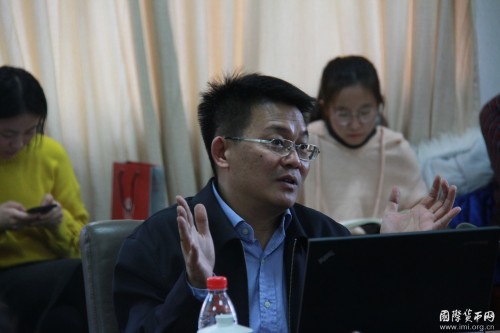Macro-Finance Salon (No. 81) Series of the 19th CPC National Congress (No. 5): The Impossible Trinity—Reflections on China’s International Financial Policies from 2009 to 2014
2017-12-10 IMI Prof. Ding first introduced the Impossible Trinity and explained the relationship among monetary policies, exchange rates and capital flow. He pointed out that in reality, many countries do not actually have the freedom to choose among the three. Mostly they would have to choose one of the two goals as the target of macro-control. However, the theory is still regarded as creed in many developing countries, causing some countries to fall into the trap of the theory. Globally, most of the developing countries that took the lead in floating interest rates experienced economic stagnation in the end and caused the inertial fall of interest rates.
Then, Prof. Ding analyzed the basic situation of China’s international account from 2009 to 2014. In his opinion, the increase in assets during this period mainly came from the increase in liabilities. It shows that China was facing an excessive inflow of capital during this period. In addition, China’s foreign exchange reserves were insufficient according to IMF’s calculation model of moderate-scale foreign exchange reserves.
Finally, Prof. Ding observed the impact of floating exchange rates on a certain economy by using the Federal Reserve Composite Index. He found that the exchange rates of developed countries’ currency indices have not changed much since the floating exchange rate of the U.S. dollar was adopted in 1973, while that of developing countries has increased 74 times, more than 98% devaluation from 1973 to 2015. He believed that the excessive capital inflow from 2009 to 2014 was the root cause of the current economic and financial problems. Combined policies of capital flow management and exchange rate management were the right choice for developing countries, including China. At the same time, capital flow management should shift from outflow management to inflow management under the macro-prudential policy framework. Deposit reserve ratio and interest rates should both go down to normalize the monetary policy. Only in this way can the macro-leverage ratio be fundamentally reduced.
Prof. Ding first introduced the Impossible Trinity and explained the relationship among monetary policies, exchange rates and capital flow. He pointed out that in reality, many countries do not actually have the freedom to choose among the three. Mostly they would have to choose one of the two goals as the target of macro-control. However, the theory is still regarded as creed in many developing countries, causing some countries to fall into the trap of the theory. Globally, most of the developing countries that took the lead in floating interest rates experienced economic stagnation in the end and caused the inertial fall of interest rates.
Then, Prof. Ding analyzed the basic situation of China’s international account from 2009 to 2014. In his opinion, the increase in assets during this period mainly came from the increase in liabilities. It shows that China was facing an excessive inflow of capital during this period. In addition, China’s foreign exchange reserves were insufficient according to IMF’s calculation model of moderate-scale foreign exchange reserves.
Finally, Prof. Ding observed the impact of floating exchange rates on a certain economy by using the Federal Reserve Composite Index. He found that the exchange rates of developed countries’ currency indices have not changed much since the floating exchange rate of the U.S. dollar was adopted in 1973, while that of developing countries has increased 74 times, more than 98% devaluation from 1973 to 2015. He believed that the excessive capital inflow from 2009 to 2014 was the root cause of the current economic and financial problems. Combined policies of capital flow management and exchange rate management were the right choice for developing countries, including China. At the same time, capital flow management should shift from outflow management to inflow management under the macro-prudential policy framework. Deposit reserve ratio and interest rates should both go down to normalize the monetary policy. Only in this way can the macro-leverage ratio be fundamentally reduced.
